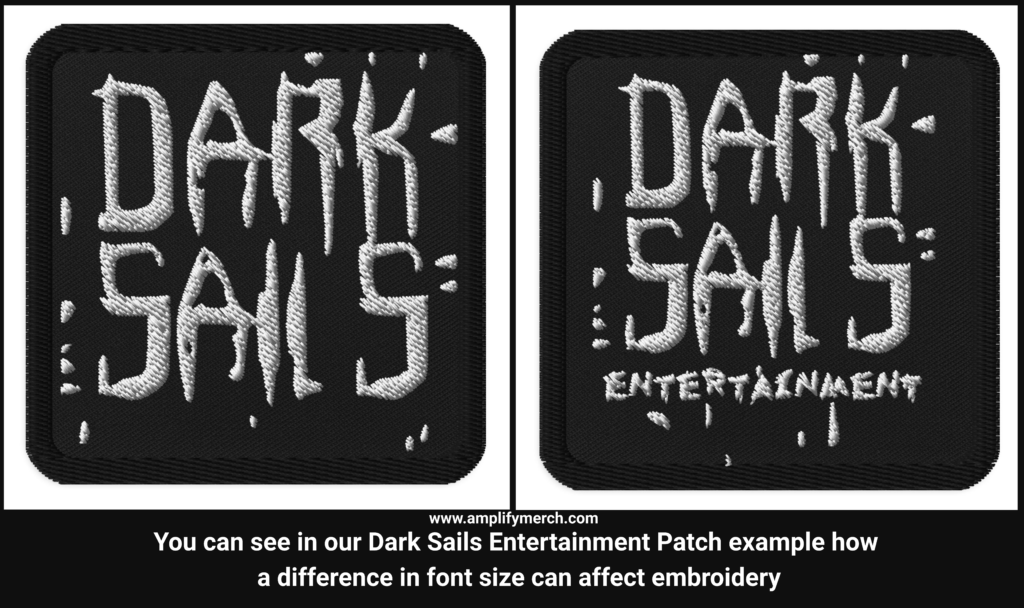We have seen it, you have seen it, and you may have even purchased some of those items from a random generic site selling “Metallica” leggings or the “classic” Metallica t-shirts that are supposedly “original” from 1992. We call bullshit.
And just because you are doing it, doesn’t mean you should be. Many people will create all these items and take the risk of infringement make A LOT of money and disappear before they get caught. Then they can make another site and do it all over again. Even if it says “Official” don’t believe it. There are very few printers that have the license to sell official Superstar bands merch, and I can promise you, it’s not a guy printing shirts at the house.
The license to sell big-name merch is EXPENSIVE. Pro sports licenses are even more expensive. Also MANY of the subscription services like Creative Fabrica, KITTL, and Canva have very limited-use licenses for images they provide. Creative Fabrica will only allow you to use their images if you have a current paid subscription. Many Canva images are not licensed for commercial use. You have to read the fine print of these agreements. Just because Canva has a Mickey Mouse premade template, that does not mean you can sell that image commercially with Mickey Mouse on your product.
Yes, We can make them, but can we sell them? Nope, not without Lars coming after us. So what is the difference between copyright, trademark limited use copyrights, and public use licenses?
Understanding Copyright Challenges and Amplify Merch’s Commitment to Legal Compliance
In today’s fast-paced world of design, fashion, and merchandising, copyright infringement is more common than ever. Whether it’s the latest “vintage” band t-shirt, leggings with famous logos, or a custom design seemingly inspired by a popular brand, consumers are often unknowingly exposed to counterfeit goods. We’ve all seen them—“official” Metallica leggings or “authentic” concert tees from 1992. But here at Amplify Merch, we take copyright and trademark laws seriously and go to great lengths to ensure the designs we create, the logos we print, and even the color combinations we use are fully compliant with licensing agreements. We pay for the accounts, the licensing, and the registrations we need. We get permission from the company. band or brand and use their logos to make their products.
The Problem with Unauthorized Merch: More Than Just a Trend
It’s a scenario that’s becoming all too familiar. You stumble upon a website selling what seems like a steal—band t-shirts, sports gear, or even pop culture icons plastered across leggings, mugs, and more. These items are usually marketed as “official” or “vintage,” but if you look closer, the fine print or lack thereof tells a different story.
As we know, some people can—and do—take the risk of infringement, make a quick profit, and disappear before the copyright owners or licensors even have a chance to respond. These individuals or groups might create a website, push out mass-produced goods, and take their earnings with them before any legal consequences arise. But just because others are willing to take the risk doesn’t mean it’s the right thing to do. And trust us, it’s not worth the headache.
The Harsh Reality of “Official” Merch
Even though an item is labeled”official” on the website or listing, the truth is far less straightforward. The reality is that there are very few printers and suppliers that hold the licenses to legally sell “official” merchandise from major bands, sports leagues, or pop culture entities. Licensing these rights is expensive, time-consuming, and legally complex. The average person running a home-based printing operation or selling on a third-party platform is most likely not licensed to sell merchandise for bands like Metallica or sports franchises like the NFL.
At Amplify Merch, we prioritize transparency and authenticity in our operations. We don’t just slap a popular band’s name or logo on our designs for the sake of profit. We respect intellectual property rights, and our customers should expect nothing less than legal, compliant merchandise that respects both the original creators and the consumers.
The Cost of Licensing: Not for the Faint of Heart
Let’s talk about the cost of official licensing for merchandise. To print and sell official merchandise for major bands, teams, or entertainment franchises, the license is not just a simple fee—it’s an expensive, ongoing investment. Major record labels, sports leagues, and entertainment companies demand high fees for the right to produce official merchandise. These fees include royalties, upfront licensing costs, and stringent restrictions on what can and cannot be sold. It’s a costly endeavor that only serious, authorized entities can afford to take on.
For instance, when you see a custom “Metallica” shirt online, it’s almost certainly not licensed—unless it comes from an authorized retailer or vendor with a direct agreement with the band or label. Even “vintage” designs are often reprinted from unauthorized sources that don’t comply with copyright laws.
Subscription Services and Image Licenses: Read the Fine Print
In addition to band merch, another growing issue lies with graphic design tools and image libraries like Creative Fabrica, Canva, and KITTL. These services provide access to thousands of images, fonts, and graphics that can be used in design projects—but there’s a catch.
Many subscription services have strict terms of use that limit the commercial usage of their content. For example, Creative Fabrica only allows commercial use if you maintain an active paid subscription. Canva has many images that aren’t licensed for commercial purposes, and yet, countless designers overlook this detail when using their resources. Just because you can download a Mickey Mouse template on Canva doesn’t mean you have the right to sell it—especially when it involves a trademarked character.
At Amplify Merch, we carefully vet every design, image, and graphic we use in our products to ensure it’s compliant with the correct license agreements. We also steer clear of using any copyrighted or trademarked logos unless we have explicit permission. The consequences of using images without the proper licensing can be severe, ranging from legal action to costly fines, and we want no part of that.
Photographs and Graphics: Credit Where Credit is Due
It’s important to highlight that photographs and graphic designs are also subject to copyright laws. Photographers and graphic designers invest their time, talent, and resources into creating unique works, and they deserve to be compensated for their efforts. Using someone else’s photograph or graphic without permission is a violation of their copyright, and it’s unfair to take credit for another person’s work.
Here at Amplify Merch, we go out of our way to get the proper permissions to use photos and designs in our merchandise. If we’re using a photo from a photographer, we not only seek their permission, but we also ensure that they are fairly compensated for their work. Whenever possible, we credit the photographer or designer on our site, recognizing their creativity and contribution.
We’re not doing this for practice, and neither are you. Every designer, photographer, and artist is working hard to create something unique, and they deserve to be acknowledged and compensated. Just like we don’t cut corners in our business, we expect the same level of respect for others’ work. Whether we’re working with photographers or graphic designers, we understand that the value of their time and creativity must be recognized.
Copyright, Trademark, and Public Use Licenses: What’s the Difference?
To navigate the complexities of copyright law, it’s essential to understand the differences between the various types of intellectual property protections:
- Copyright: This protects the creative work itself, like artwork, songs, writing, and films. Copyright holders have exclusive rights to reproduce and distribute their work. You can’t just use a song or painting in your merchandise without permission.
- Trademark: This protects logos, brand names, and other identifiers that represent a brand or company. Using the Nike “swoosh” logo or the Coca-Cola name without authorization is a violation of trademark law.
- Limited Use Copyrights: This is a more specific licensing agreement, where the copyright holder allows others to use the work under strict conditions. For example, a photographer might allow their photos to be used for certain types of advertising but not for merchandise.
- Public Use Licenses: These are often used for images and content that are free to use, but with specific conditions attached. These conditions include not using the image for commercial purposes or requiring attribution.
At Amplify Merch, we take all these factors into account when creating designs. We respect intellectual property and ensure that all of our products fall within legal boundaries—so our customers can shop with confidence.
Conclusion: Why It Matters
The world of copyright and trademark law may seem complex, but it’s essential for everyone involved in the design, creation, and sale of merchandise to understand and respect intellectual property rights. At Amplify Merch, we carefully monitor our designs, logos, and images to avoid any potential copyright infringement issues. We invest the time, effort, and resources necessary to ensure that our products are fully licensed, compliant, and legally safe.
It might seem tempting to cut corners or take a shortcut with unauthorized designs or images, but the risks involved simply aren’t worth it. Not only do you put your business in jeopardy, but you also undermine the hard work and creativity of the original artists and creators. So, whether you’re buying or selling merchandise, remember: just because something looks official doesn’t mean it is. Trust the experts who prioritize copyright compliance—like us at Amplify Merch—and make sure your purchases and creations are truly legitimate.
Contact us today to get your brand online!



















